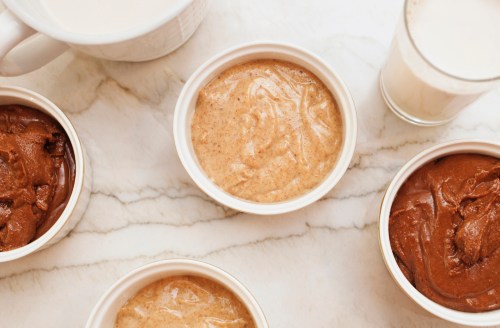Our editors independently select these products. Making a purchase through our links may earn Well+Good a commission
Move over, almond butter: watermelon seed butter (yes, really) is ready to be the new hero of your pantry
A registered dietitian explains the nutritional benefits of watermelon seed butter and how to incorporate it in your diet.

There’s certainly no shortage of nut butters on the market, but brace yourselves: the future of alternative spreads is here, and we’re only just getting started.
In October, Whole Foods predicted that 2020 would be a big year for expanding beyond traditional almond, peanut and other nut butters. Now, companies are thinking outside the box when it comes to spreads, turning non-traditional ingredients, like flax and macadamia nuts, into jars of creamy, nutritious butters ready for snacking. On their list is one unlikely hero you might soon see on your local grocery store’s shelves: watermelon seed butter.
Yes, you heard me right—watermelon seed butter. It turns out the little black seeds you spit out while eating a juicy slice of watermelon are actually super nutritious (and despite what your second-grade classmates told you, won’t grow into a watermelon in your stomach). When separated from their black shells, they can be ground into a luscious, tahini-like spread that’s the perfect way to jazz up your regular PB and J. You might be feeling a bit skeptical about this, which is understandable. Here’s why watermelon seed butter is a healthy food trend legitimately worth trying.
When it comes to health benefits though, this RD says you just can’t beat peanut butter:
What are the benefits of watermelon seed butter?
1. It’s a great source of healthy fats. Like other seeds, watermelon seeds are jam-packed with unsaturated fats, says Philadelphia-based dietician Elle Bernardo, RDN. “One of the most important fat in seeds is the omega-3 fat alpha-linolenic acid or ALA,” she says. “Omega-3s are essential fatty acids that the body can’t make on its own. They play different roles in the body, which include reducing inflammation, promoting brain health, and heart health.”
2. Watermelon seeds have lots of antioxidants. “They’re particularly high in various phytochemicals, like flavonoids, which have been researched to play a beneficial role in disease prevention,” says Bernardo. Antioxidants, of course, help combat damage done in the body from free-radicals, which can also help maintain skin health and fight inflammation.
3. It’s high in plant-based protein. Like other seeds and seed butters, watermelon seed butter has a hefty dose of protein per serving. One two-tablespoon serving of 88 Acre’s Roasted Watermelon Seed Butter ($27 for two jars), for example, offers up eight grams of protein—about what you’d get for a serving of peanut butter, and more than the six grams in a serving of sunflower seed butter. Not too shabby, watermelon seeds!
4. It’s rich in essential minerals. Similar to nuts, seeds like watermelon seeds can also be great sources of minerals like magnesium, zinc, and iron. “Every seed is going to have different proportions of each, but these minerals can help make protein, support the immune system, aid in digestion and deliver oxygen throughout the body,” says Bernardo. A serving of watermelon seed butter (depending on the brand) can help you meet 35 percent of your daily recommended magnesium intake (great for muscle recovery and sleep), 10 percent of your iron intake (good for energy), and 20 percent of your zinc intake (important for immunity and skin health).
5. It’s a healthy allergy-friendly option. People with nut allergies have long had to remain ignorant of the joys of almond butter on toast or peanut butter cookies or pad Thai takeout. But seed butters, like watermelon seed butter, offer up a nice, allergy-friendly alternative that functions like a traditional nut butter.
Sold—how can I start eating more of this stuff?
The only downside to watermelon seed butter: it’s still a little niche. There are really only a few brands who make it—specifically, 88 Acre Roasted Watermelon Seed Butter ($27 for two jars) and Dastony Stone Ground Watermelon Seed Butter ($8). But as it continues to expand to more and more stores (like, ahem, Whole Foods), you can expect to find more brands trying to jump on the bandwagon.
Once you have it in your pantry, it’s really easy to enjoy and use on the reg. “Ideally seed and nut butters should be used as a nutrient boost to meals and snacks,” says Bernardo. “Pairing one to two tablespoons of a seed butter with a serving of carbohydrates, such as a piece of fruit or rice cake, is the perfect combination of nutrients for a snack.” You can also cook with it like you would with any other nut butter, whether that’s using it instead of tahini to make a salad dressing or adding it to desserts and snacks (like these healthy brownie bites).
It might seem strange at first to buy a jar of something that’s made almost exclusively with an ingredient that we throw out. But considering its major nutritional perks, watermelon seeds feel truly deserving of their new, cauliflower-esque glow-up.
Watermelon seed butter isn’t the only one having a moment. Here’s why macadamia nut butter is the scrumptious spread your pantry is missing. And here’s the low-down on almond versus peanut butter, as told by nutritionists.
Sign Up for Our Daily Newsletter
Get all the latest in wellness, trends, food, fitness, beauty, and more delivered right to your inbox.
Got it, you've been added to our email list.










